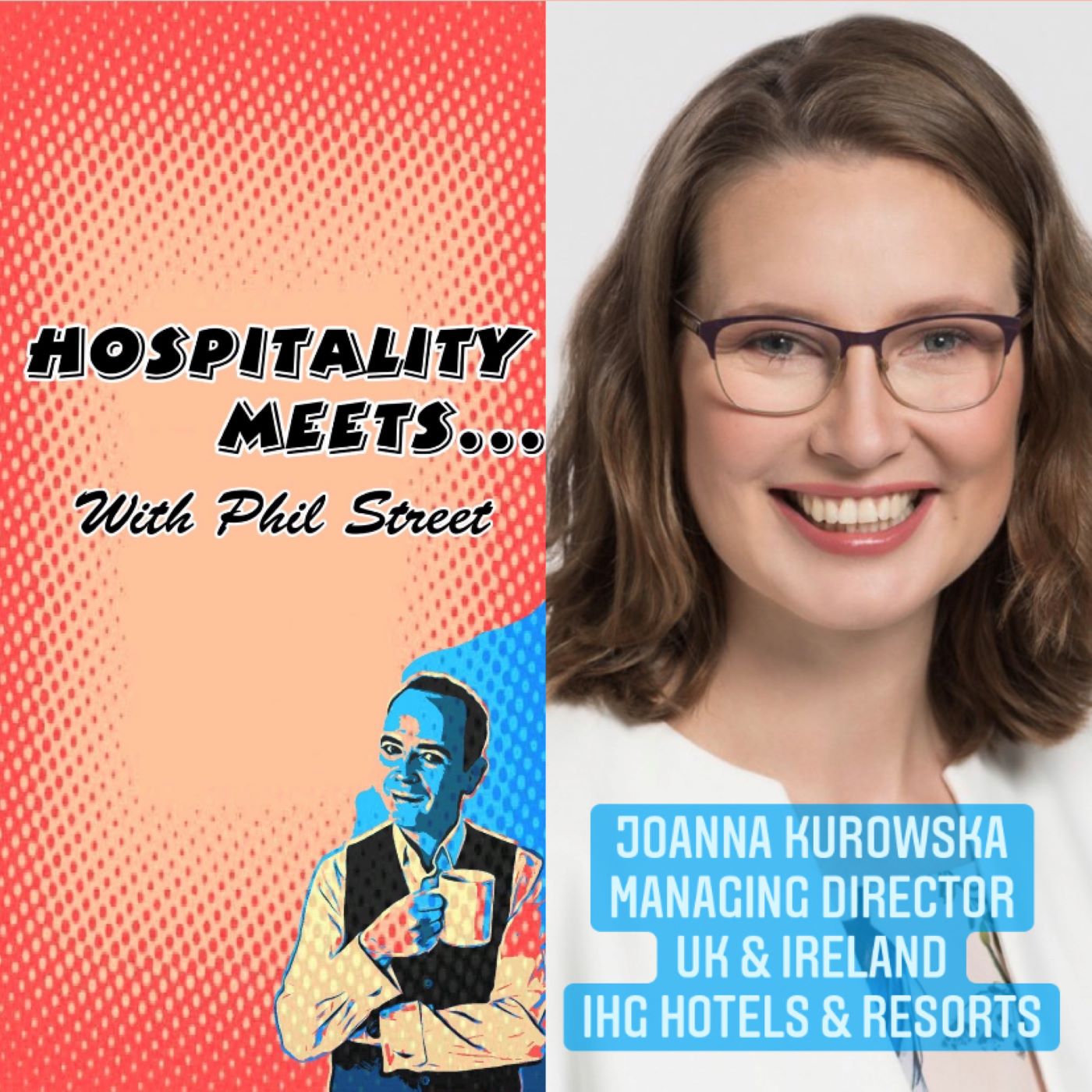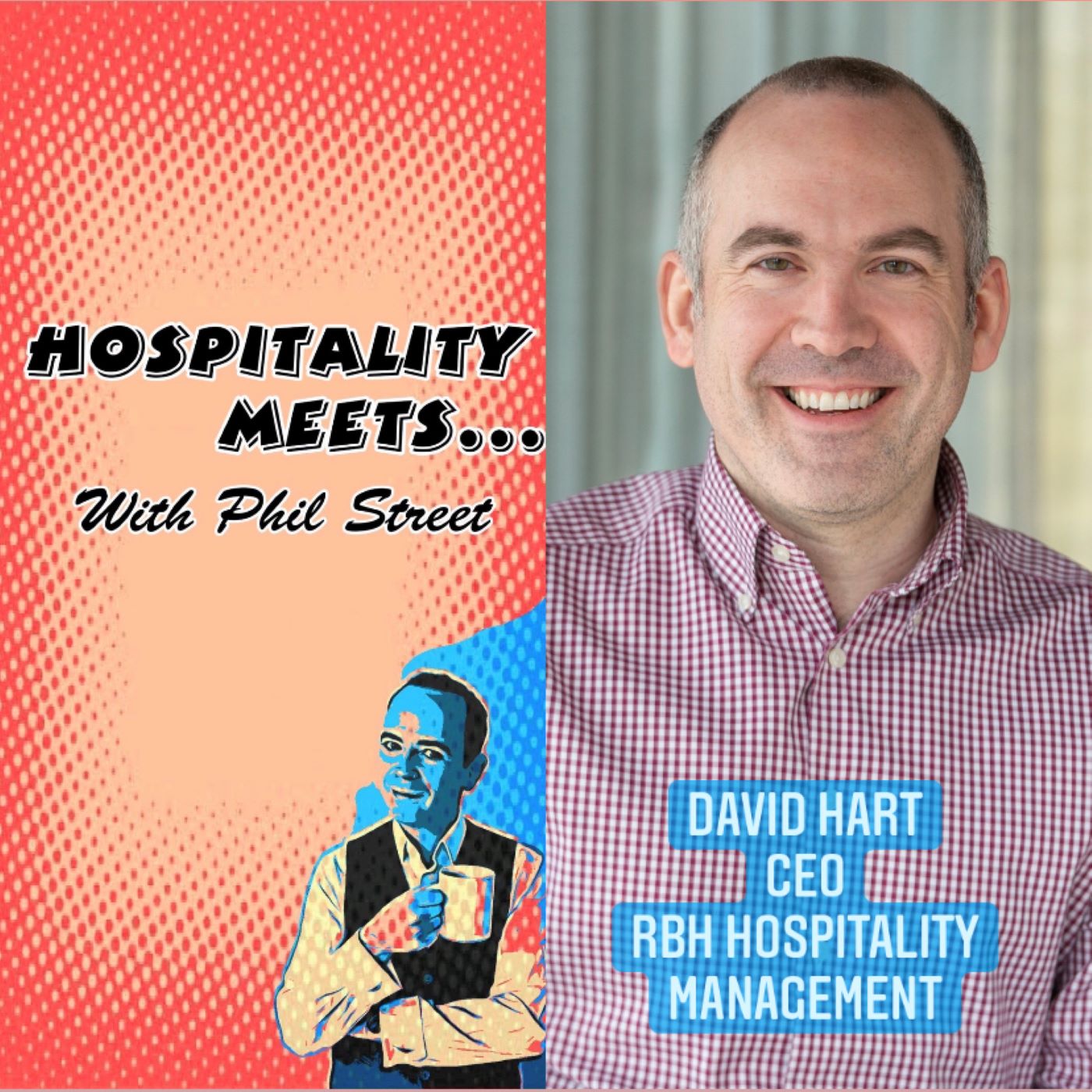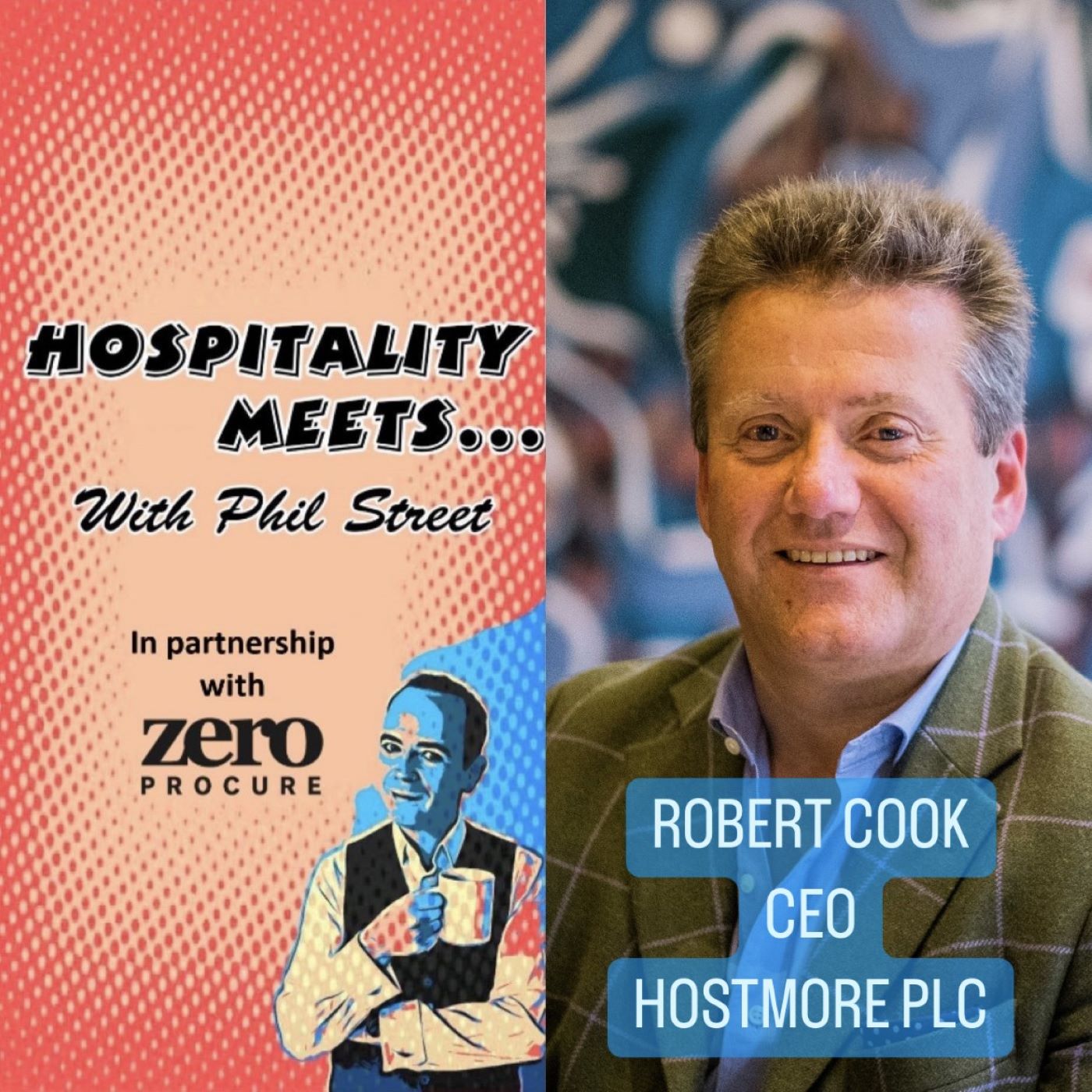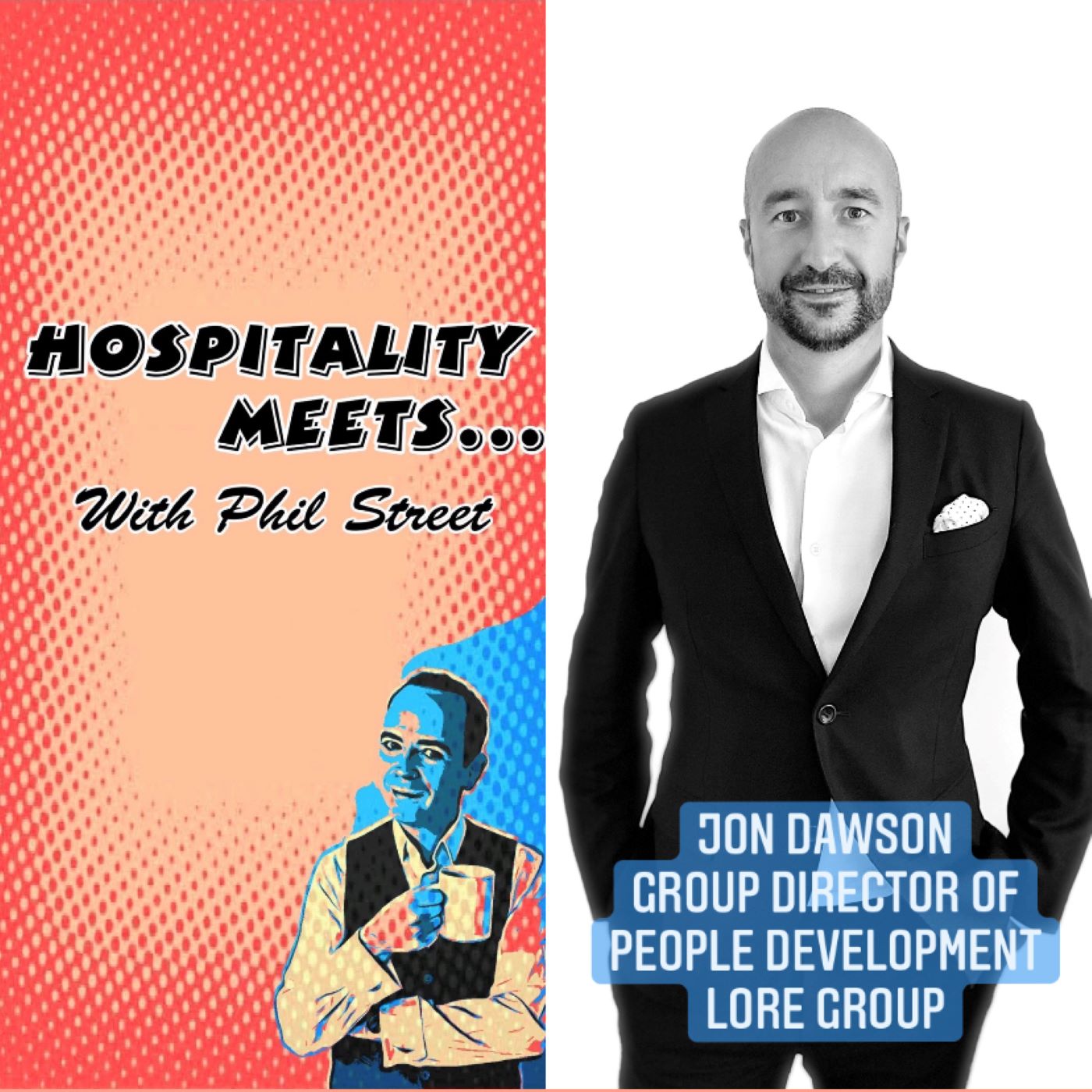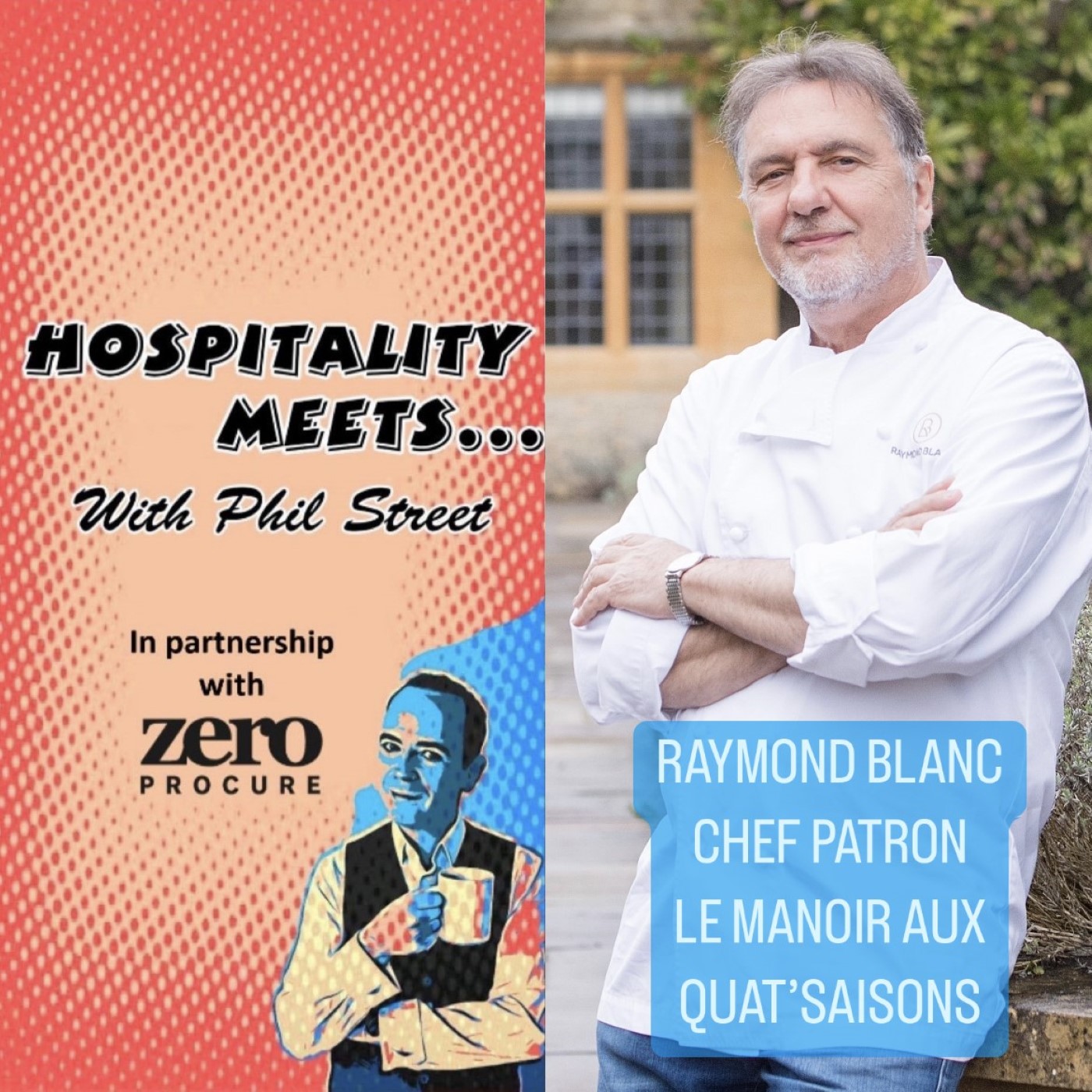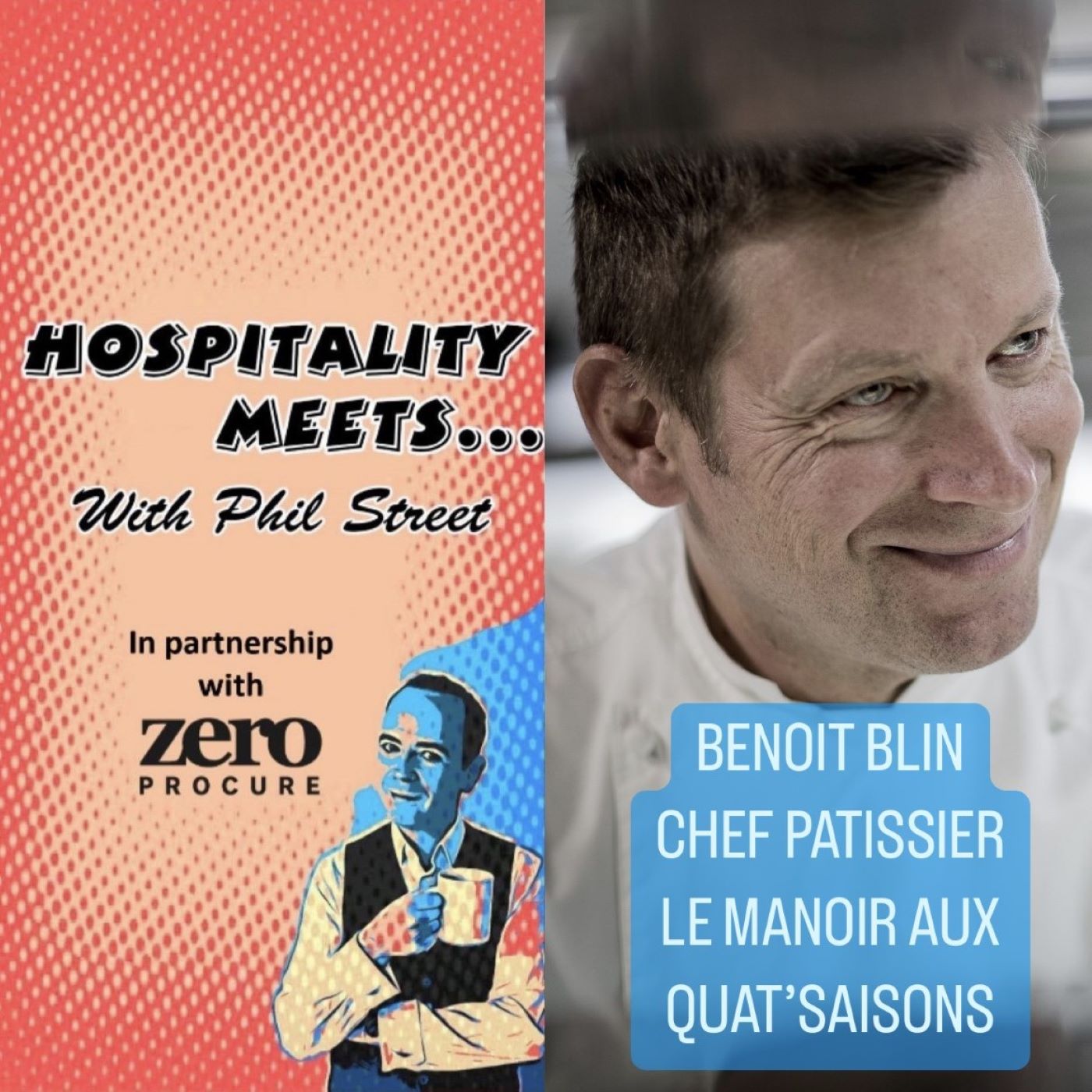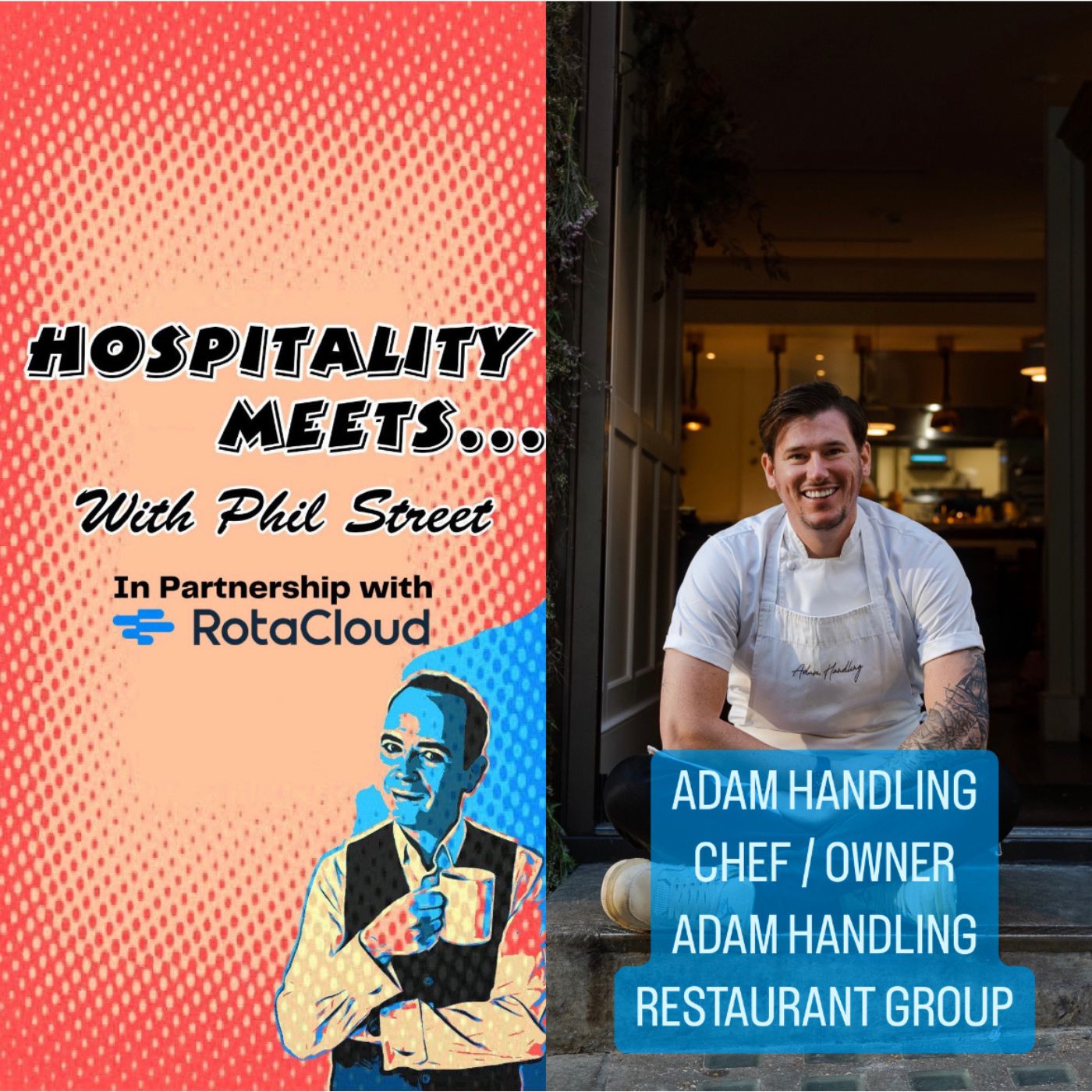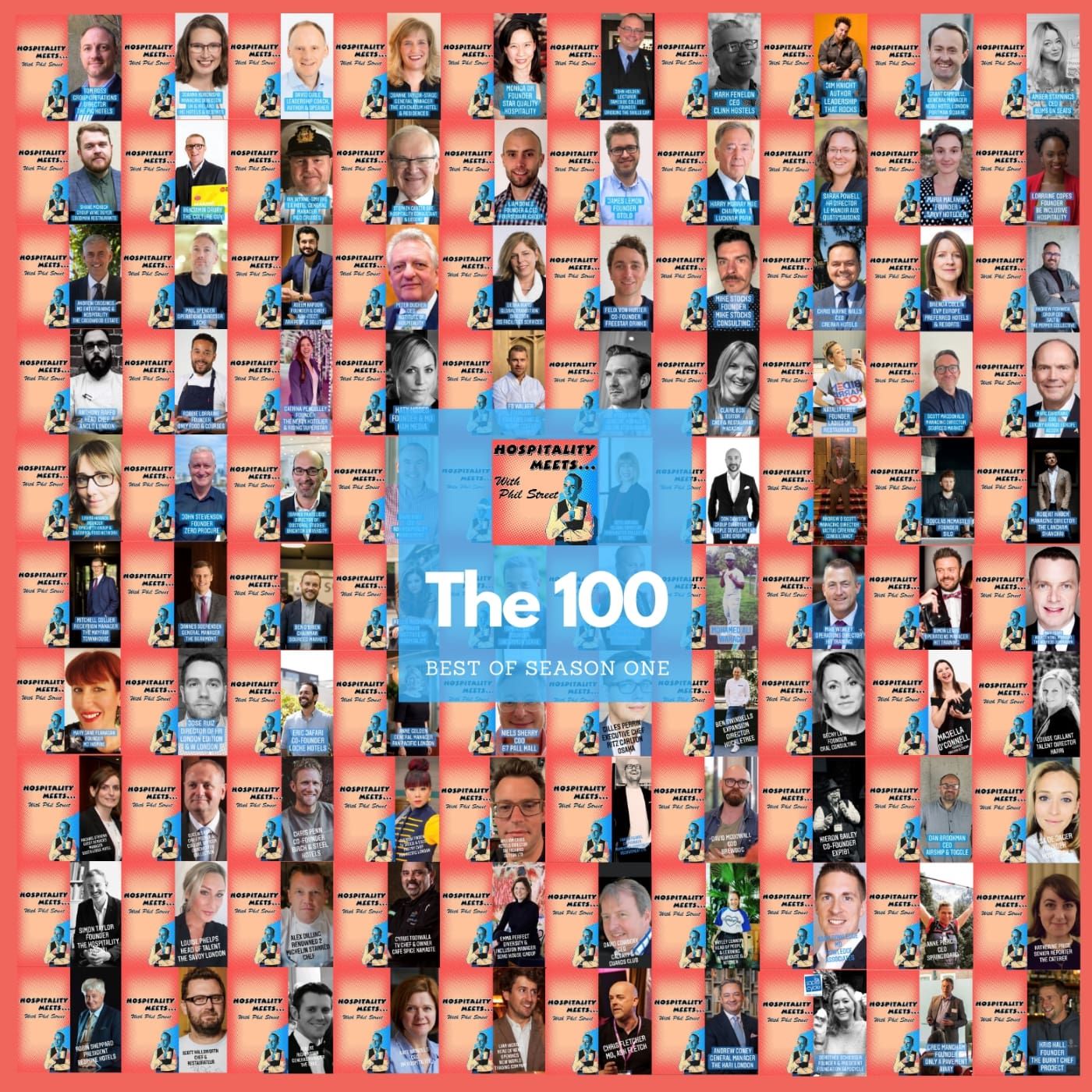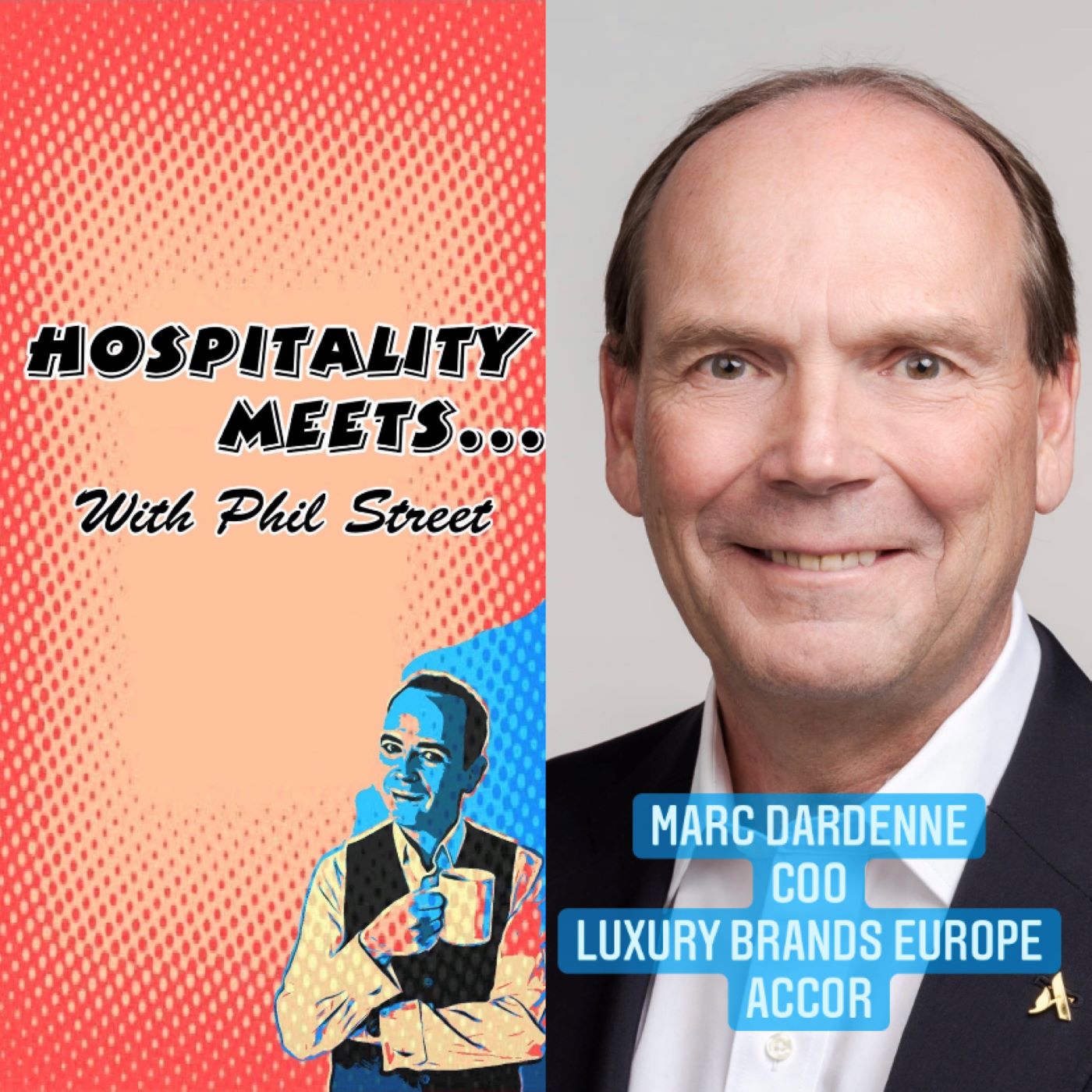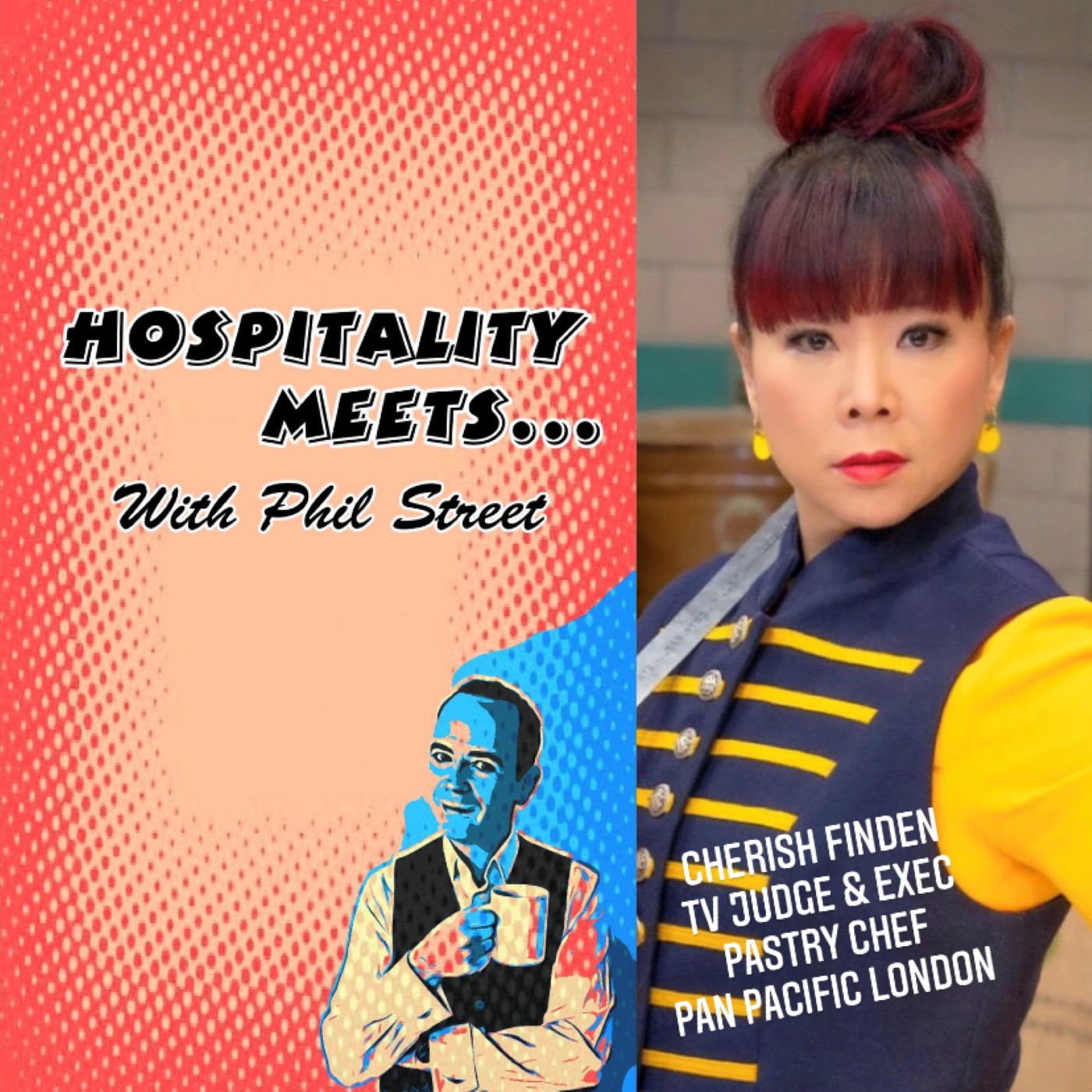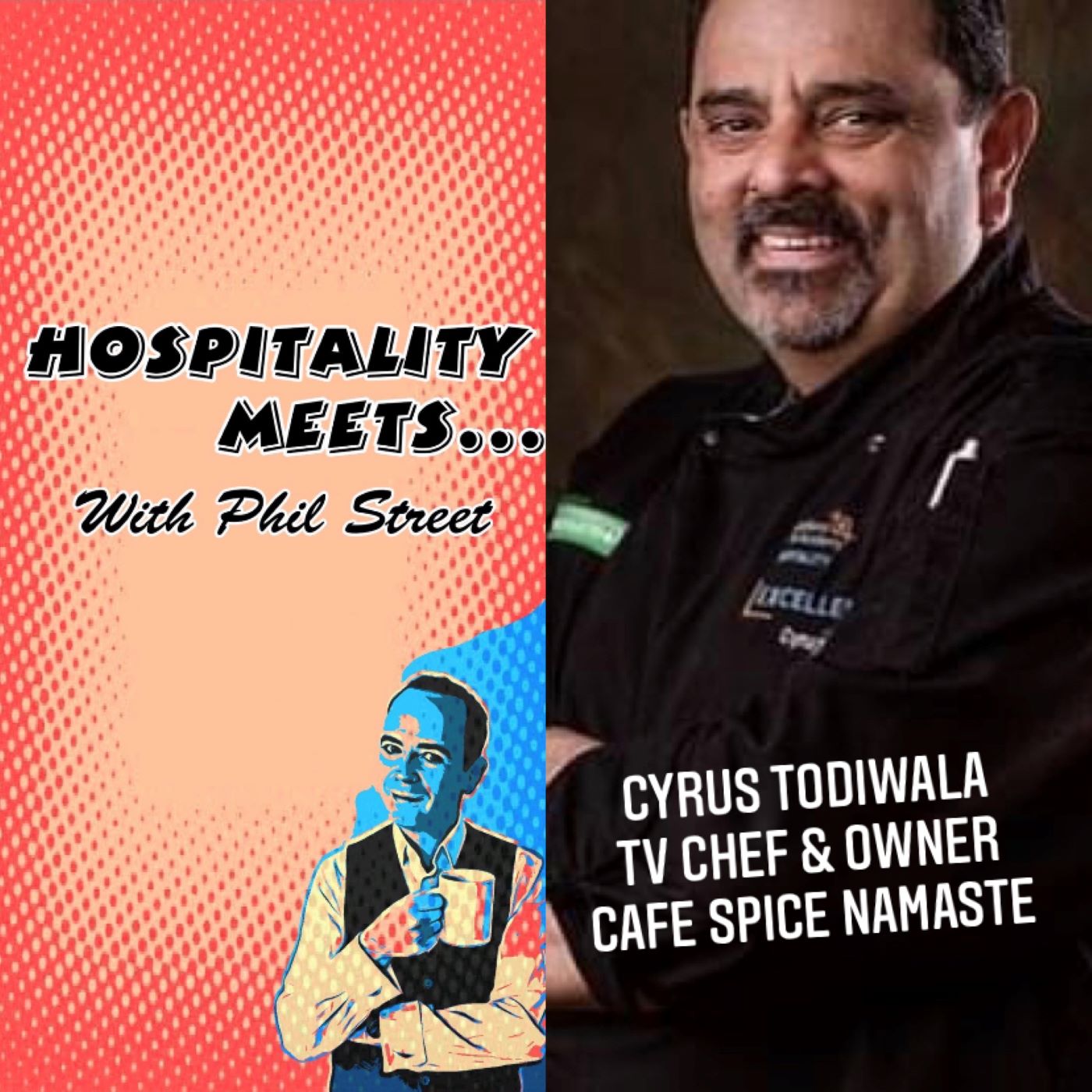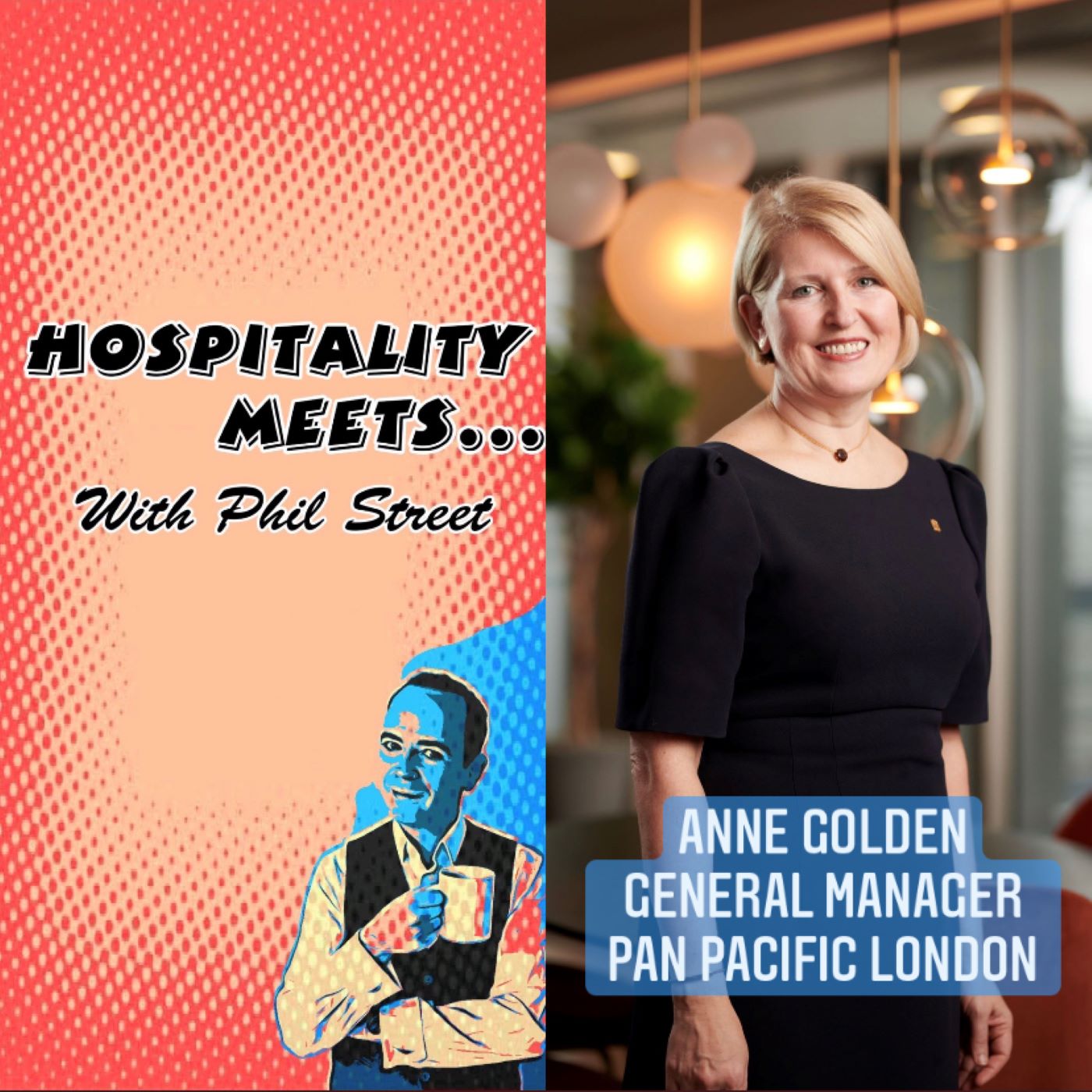#196 - Hospitality Meets Imran Hussain - Bold Moves and Lifelong Learning

Episode Overview:
This week I was lucky enough to grab some time with for an entertaining and insightful conversation with the eminently engaging Imran Hussain, the innovative Chief Marketing Officer of Chateau Denmark (https://www.chateaudenmark.com). This episode of “Hospitality Meets” sheds light on the quirky, unpredictable, and exciting world of hospitality, capped with laughter and memorable anecdotes.
Episode Highlights:
- Behind-the-Scenes Comedy
- : Imran shares a hilarious story of his early career mishap, where he printed "canopies" instead of "canapés" on 3,000 invitations, teaching him a lifelong lesson on attention to detail.
- Energetic Conversation
- : The banter between Phil and Imran is infectious, from joking about creating a superhero squad named “Superheroes of Stupidity” to witty remarks about Shoreditch's dynamic past and transformation.
- Charisma and Passion
- : Passionate about architecture and community, Imran shares his heartfelt reflections on the evolution of Kings Cross and his latest ventures at Chateau Denmark, turning historic spaces into modern, culturally rich hospitality experiences.
Key Takeaways:
The Art of Learning from Mistakes:
- Imran's story about the "canapés" mishap remains a stellar example of humility and owning one’s mistakes. It’s a reminder that errors, no matter how embarrassing, are invaluable learning moments in one's career.
Innovative and Ageless Hospitality:
- The shared philosophy that hospitality is not just a job but a calling shines through. Imran and Phil both echo the importance of embracing the unpredictability, ongoing learning, and excitement that come with creating exceptional guest experiences.
Community and Cultural Integration:
- Imran’s vivid storytelling about projects like Chateau Denmark and The Pilgrim reveals his dedication to creating hospitality spaces that respect and enhance their neighbourhood's essence, emphasising the deep interconnection between a hotel and its surrounding community.
Don’t Miss:
- Phil’s visit to Chateau Denmark
- : Get first-hand insights into what makes this place uniquely captivating.
- Imran’s Career Influences
- : Discover how a coffee table book and a general manager named Michael changed the trajectory of Imran’s career.
- Humorous Reflections
- : Enjoy the contagious laughter and light-hearted exchanges that make this episode a treat to listen to.
Stay tuned for more enlightening conversations every Wednesday at 08:00 p.m. on your favorite podcast platform!
Listen and Subscribe:
Make sure to subscribe to “Hospitality Meets” and share this episode with fellow hospitality enthusiasts. Follow us for more episodes filled with industry insights, humour, and inspiring stories.
Get ready to laugh, learn, and be inspired by the incredible journey of Imran Hussain in this week's episode of “Hospitality Meets”!
The Guest
Imran Hussain is the Chief Marketing Officer at Chateau Denmark
Instagram - @imran_hussain
Chateau Denmark - @chateaudenmark
The Sponsor
Today’s episode comes to you in partnership with RotaCloud, the people management platform for shift-based teams.
RotaCloud lets managers create and share rotas, record attendance, and manage annual leave in minutes — all from a single, web-based app.
It makes work simple for your team, too, allowing them to check their rotas, request holiday, and even pick up extra shifts straight from their phones.
Try RotaCloud’s time-saving tools today by heading to https://rotacloud.com/phil
This podcast uses the following third-party services for analysis:
Podcorn - https://podcorn.com/privacy
Phil [00:00:02]:
Welcome to hospitality meets with me, Phil street, where each week we take a light hearted look into the stories and individuals that make up the wonderful world of hospitality. Today's guest is Imran Hussain, chief marketing officer of Chateau Denmark in London. Coming up on today's show, Imran talks.
Imran Hussain [00:00:20]:
About it and if you have it, you can't lose it, you can't trade it, you can't buy it, you have it.
Phil [00:00:26]:
Phil creates a new superhero cohort. Superheroes of stupidity unite. And Imran learns the lessons from his past.
Imran Hussain [00:00:35]:
I definitely know the difference between a canopy and a canapee now.
Phil [00:00:38]:
All that and so much more as Imran chats us through his superb journey so far. It was a total joy to sit down with Imran and learn about his journey. And hes got some great stories and lessons for everyone in here so id be forever grateful if you can hit that subscribe button and tell everyone you know. Enjoy. And a huge hospitality meets welcome to someone that has once been referred to as the most innovative marketeer in hospitality. I'll tell you the source soon, but that is none other than Imran Hussein.
Imran Hussain [00:01:08]:
Well, thank you very much for having me. That is a warm welcome.
Phil [00:01:12]:
You're very, very welcome. We've been trying to do this for God knows how long, right, but we're here now and that is all that matters.
Imran Hussain [00:01:19]:
Exactly. Thank you.
Phil [00:01:21]:
You're very, very welcome. So just tell the world what you do currently.
Imran Hussain [00:01:24]:
So I am CMO, chief marketing officer for Chateau Denmark, which is a hospitality brand that exists across 16 buildings along 100 yard Denmark street here in Soho.
Phil [00:01:36]:
Yeah. And I've actually been lucky enough to spend a bit of time with you there and see it in the flesh. And I was kind of blown away. But I'm not going to get into this right now because we'll come to that in the fullness of your story. We want to get your story in first. So take us all the way back. How did you get into hospitality in the first place?
Imran Hussain [00:01:56]:
Oh, God. I mean, so I studied marketing communications as a degree and I. It's actually marketing, mass communications and cultural studies, funnily enough.
Phil [00:02:06]:
And just rolls off the tongue, doesn't it?
Imran Hussain [00:02:09]:
Yeah, yeah. It's weird that you still remember it. It's like sort of being in prison and it's like I had to refile loads of dissertations. I ended up picking syllables and courses that involved loads of dissertations, probably because I was never that great at exams, which bodes well for this. But what happened was I realized pretty early at a young age, that in order for me to write something that was, like, 20,000 words, I had to have some sort of care about what I was writing. And I wrote my post grad dissertation on launching a hotel in Shoreditch. But, you know, this was. I mean, I'm old, so, like, this was, you know, in the two thousands.
Imran Hussain [00:02:50]:
So Shoreditch was a part of town that people drove through fast, if at all. You know, I don't even think, like, the first coffee shop had opened yet. And so for no other reason than I was living there at the time, I suppose I chose Shoreditch. But the thing that I really wanted to do there was, in those days, diesel, the clothing brand, was, like, on everybody's lips. And I. What a lot of people didn't know is that the owner of Diesel at the time, Renzo Russo, he had a small hotel in Miami called the Pelican. And I was obsessed by this notion that there was this 35 bedroom hotel on Coconut Grove. I think that had.
Imran Hussain [00:03:24]:
It was, you know, each room was different. So there was one room made of mirrors that was called Mitarzan Yuvain. And there was another room that was a bordello lounge that apparently would have made hardy flies blush, apparently. And so I thought, God, wouldn't it be cool to do like this? You know, wouldn't it be cool to do that hotel in Shoreditch? I don't know where my mind came from. Probably because I was living in Shoreditch at the time, and diesel was. Hang on.
Phil [00:03:48]:
So basically what you're saying is that you are the whole reason why Shoreditch took off. That's what I'm hearing here.
Imran Hussain [00:03:57]:
Yeah. I mean, I was talking to a super narrow audience. I mean, you never know. I don't think it was me, but, I mean, it was fun. And, you know, to kind of imagine a nightlife place as you know, its colors are so daytime led at the moment. Right. Shoreditch is all about people riding bicycles, wearing backpacks with beards and drinking coffee. Right.
Imran Hussain [00:04:17]:
But at the time, it was super bleeding edge and, like, very, like, there was a bar called siegfrieds, right? And they had a matchbox. And in. Because in those days, matchboxes were part of the paraphernalia that bars and hospitality brands would use to communicate to people outside of their walls. Right youd pick them up, take them home, do whatever. And on the back of it, it had reviews. And one of them was from, I don't know, the Evening Standard or some newspaper. And it said, avoid this place at all. Costs.
Imran Hussain [00:04:46]:
I was like, this is unreal. Like, people are writing about this stuff. This is amazing. And I was just like, there was something in the energy of Shoreditch in those days that is different now, but everything changes, energy evolves, it doesn't dissipate. And I think kind of, you know, wanting to do a hotel like that, that was like diesel and pelican and branded and heavy. I think it was just. There was something about it that just spoke to me. And I think, like most people that you speak to that work in hospitality, you know, it's a little bit like you fall into it and then you fall in love with it.
Imran Hussain [00:05:19]:
And it's not quite like my mum says about arranged marriage. You'll learn to love, but it's more like you just fall into it. Like you. Just like Alice in Wonderland, you tumble down the rabbit hole and it either at that point means something to you or it doesn't, right? Like, that's true. And. And so as a result, you kind of end up kind of going, oh, well, actually, this is like a way that you can communicate to people, right? And a way that you can to show them what your cultural dials are, what your understanding of art, fashion, music, film is. And. And I was really quite blown away by the hotel model as a vehicle to explore culture, really, more than anything else.
Imran Hussain [00:06:02]:
And then shortly after that, and I think one of the people I interviewed at the time, my flatmate at the time, actually had a book on cool hotels. Remember those coffee table books that, you know, it's like, what is it? Like eagle Eye Cherry's album, a hotel coffee table book, and, like, you know.
Phil [00:06:16]:
Candle wax, eagle eye cherry. You're showing your age now.
Imran Hussain [00:06:18]:
Wow. This is it, right?
Phil [00:06:20]:
Yeah.
Imran Hussain [00:06:21]:
And so, you know, the stalwarts of everybody's coffee table was, you know, a hip hotel's book, a design, hotels book, whatever it was. And I picked up the book and my dissertation lecturer said, listen, you got to interview somebody in the industry, right? Like, if you can't get hold of whoever this bloke Lorenzo Rosso is, then, you know, try and get hold of somebody else in the industry. And I picked up the book and I called a little brand, and the guest service manager picked up the phone. She introduced me to a gentleman who I didn't know would play such a big part in my life going forward. Gentleman by the name of Michael Ribeiro. And he, at the time, was the general manager of my hotel, Bloomsbury, which was just in Bedford Square. And fast forward, long story short, trip to Dubai, didn't like it, came back, ended up going to work for that brand and working with Michael. And he, I think, was the first person that ever said the words Ian Schrager to me.
Imran Hussain [00:07:13]:
And it's, like, fast paced. And Michael took no prisoners in a conversation. Right. He didn't mind if you weren't keeping up. He was still going to go down his road. And, you know, he's such a great general manager and somebody that I'm proud to say that I learned from. And he was kind enough to spare me some time and gave me some cues, told me where to look, what was interesting, you know, all this kind of stuff. And so suddenly these names become part of your everyday life, and you go home and you're kind of like.
Imran Hussain [00:07:42]:
And I think that summer I had been to see my sister in law in Ladenhead, and we ended up going for dinner at the Mondrian Hotel in LA. And I'm standing around and I'm like, somebody was telling me about this place, and I'm like, these names are familiar. And then I go back and read these notes, and I'm like, wow, okay. All right. All of this universe is very real, and I've actually walked around in some of it now. And then you're just tumbling just a little bit further down the hole, and you're starting to get to know these characters. And then you start looking into the background and you're like, goddess. You know, like, this is a fascinating industry made up of some, even at that time, really interesting people who were.
Imran Hussain [00:08:21]:
Who were genuinely innovative. Maybe I just pretend to be, and, you know, I don't think you can ever.
Phil [00:08:27]:
You can't classify yourself as innovative, can you? That's the thing. Somebody else gives you it. That's all fine. But, yeah, if you say I'm really innovative, then I don't think people really warm to that, do they?
Imran Hussain [00:08:38]:
No one buys it. No. And so anyway, so then as a result, I kind of just. I don't know, you fall into it and you go further and further down. I ended up working for my hotels, ended up helping them open another hotel that they were opening, and did a bit of work with a designer called Kareem Rashid, who was the first person ever, I think, said it in a sentence, or at least one that I'd read, that hotels could be a conduit for fashion, music, film, culture, art, all of it. And to understand those things is underpinning what true, not hospitality, was, but what hospitality designed was. And then, of course, you start to learn the business end of it. Right.
Imran Hussain [00:09:17]:
What true hospitality is, what it means, how it comes to be, the fact that you can't teach it. It's within you. You know, like, you either have it or you don't. And if you have it, you can't lose it, you can't trade it, you can't buy it, you have it. And I think hospitality is something that is a calling and something that is, you know, it's such a special industry for so many reasons, not least because of the people you get to meet, but the things you get to do and the journey you then go on and the things that you never thought would actually be possible, I suppose.
Phil [00:09:51]:
Yeah, absolutely. So you were. This was your kind of, your first foray into the world of hospitality was through. Through my hotels. I remember the brand, actually. It was in itself, quite a cool, quirky brand, actually. I mean, and actually, that probably was about the same sort of time that I entered into the London marketplace. So I knew nothing about anything, really.
Phil [00:10:14]:
I mean, you could argue nothing's really changed. Yeah. So I wasn't even aware of half of these brands until probably two or three years later when you start getting your head around the landscape and things like that. But what I really like about that is actually, and you kind of highlight something that's come up on this show quite a lot, is actually, I don't really know if I should be calling it luck as such. But you are kind of either lucky or not to be in with the right people when you get started in this industry. Right. Because you had, I suppose, this opportunity and you've felt like you were just, you know, you'd almost found your calling more or less immediately getting taught by somebody who you had amazing knowledge and a really innovative mind and how much these, these moments shape you, you know, in terms of what I mean. Well, obviously, come on.
Phil [00:11:08]:
I'm just making assumptions as to what happens next and why you will that kind of mold you into who you are going to become or not, depending on the experience that you have.
Imran Hussain [00:11:17]:
Yeah, absolutely. And, you know, Michael was one individual. I mean, Andy Thracevulu, Jason Kataraeglu, there were so many people that form part of that journey that you then go on and part of the learning curve that you learn from people who, it's about surrounding yourself with the right people and to have that ability to be able to, like a sponge, soak up different things. And I think you're right. You're either lucky or not. And anybody who's gotten anywhere in life and I'm certainly not saying that I have, but anyone who's gotten anywhere in life, I think it would be foolish to not think that luck was a big part of it.
Phil [00:11:53]:
Yeah. And then there's the argument about making your own luck. Right.
Imran Hussain [00:11:58]:
You have to do something.
Phil [00:12:00]:
Yes. They're doing nothing. I'm so lucky.
Imran Hussain [00:12:06]:
I'm lucky. It's fine. And look, there's not much of what we all do in the hospitality industry. It doesn't always feel like luck when it's happening, either. That's the other thing, you know?
Phil [00:12:19]:
Yeah, but this is actually. That's something that's come to me. I hate using words like later in life because I'm still a young man. But, you know, the. The latter half of my existence so far are where maybe all of these lessons that you learn that you don't realize you're learning them in the moment, but you then, you know, in a moment of reflection, you can look back and, God, you know what? All that toughness that I had, all that. All those moments where I felt like I'm completely out of my depth or I'm just, you know, I'm just not getting this or whatever. They're actually the moments that you can. Not that I go craving them now, but I am definitely, like, I quite enjoy tough moments now because I know that there'll be lessons.
Phil [00:13:01]:
I know that they'll be. It'll be a bit. A bit crap in the. In the moment that you're in, but on the other side of that, you'll be much better for it.
Imran Hussain [00:13:10]:
The sweet isn't the sweet without the sour.
Phil [00:13:13]:
Exactly that. Exactly. I knew the marketer would have the right words for that. I'm just a waffler.
Imran Hussain [00:13:20]:
Razors. It's a byproduct that I have.
Phil [00:13:24]:
Yeah, absolutely. So what happened next? Where did you go after that?
Imran Hussain [00:13:29]:
So then, I mean, you know, I spent a long time there, you know, helping them open those hotels and helping, you know, with social media. I think at that time, nobody had really embraced social media. And you become known as the digital marketing social media guy. And I was lucky enough to work with Avio, who, great booking engine platform. At the time, it was Brian Reeves and Frank Reeves, Caroline Dunley, David Brett, who were just, you know, like, it was like going to school every day and learning these things. And, you know, I always think, you know, we built a website together that, you know, was a good looking website and it won awards and it generated an unreal amount of revenue. And I think, you know, I always think that's the holy trinity, right? Something that can do all three of those things doesn't come about every offer, every, all the time. And I think after that gives you more confidence to do the next thing.
Imran Hussain [00:14:17]:
To do the next thing, to do the next thing. And I went to go helped open the great Northern hotel in King's Cross, which was a lot of fun and really enjoyed that opening, actually. And to this day, it's still one of my favorite hotels in the city because 91 keys, 100 person dining room on the first floor, ground floor bar. And again, that was a part of town that people only ever used to drive through fast, right? Nobody went to Kings Cross in 2013, right. I went to St. Paul and goes to Kings cross, you know, and it's a very different universe. And, you know, it's mad, isn't it?
Phil [00:14:49]:
Just right next to each other. It's just madness.
Imran Hussain [00:14:53]:
And, you know, from Kings Cross Square, I mean, at that time, even, like, the Google building was still a pipe dream. You know, all of it was just took so long to come that you were just that one building there, and you knew that you were going to be, you know, the hottest thing on the street in like, a year or so's time. But, you know, you just had to get a. From here to there and doing that because you're an island, really, in Kings Cross. It's basically a giant roundabout on some level. Kings Cross station, that is. But it was such an amazing experience because it was like a small grand dam hotel, to be able to do burlesque and cabaret shows in there, that people just would never think that those things would go in a room like that to be able to. I always think there are certain things that can happen in a room and certain things that cannot happen in a room, and that doesn't mean that they all go.
Imran Hussain [00:15:39]:
But I've got a fascination with architecture, and I think a building will tell you so much about what it wants to do, what it's prepared to accept. I know this might sound a little haikru to a lot of people, but I think every single space has an energy, and what went on there before can dictate what happens there in the future. And that was one of those amazing buildings that had been, you know, a curvy, linear building, you know, by. By Lewis Cubitt. I mean, it was really something else. Nothing. They didn't engineer things like that in those days. And, you know, it did also mean that you were on a bend like that.
Imran Hussain [00:16:17]:
So the rooms in the middle were. But it was an amazing experience. And to work with some of the great people there, I think, you know, was just a real pleasure. And again, learning from them as well. And then I just, you know, there's a part of you that's, I always say to people, once you've opened a hotel, you'll spend the rest of your life wanting to open hotels. Right? Because there's something that's.
Phil [00:16:40]:
It goes one or two ways, right?
Imran Hussain [00:16:42]:
Yeah. Yeah. There's something that's, like, grossly addictive about it. And, you know, and I was in. I was in a. In another life and in many lives, I've done lots of programming at different events and different venues. And I did a talk once with one of the creators from Kessels, Kramer, and he said something that was really, really cool. Because the thing about being creative, right, is that it's amazing.
Imran Hussain [00:17:06]:
It's euphoric, it's joyful, it's excitement. But it's also misery, jealousy, dissatisfaction and unhappiness. And the truth is in the balancing point of those two things, and that's something that I've always kind of remembered, you know, the more you do, the more you want to do. So you start looking beyond the obvious projects. So then at the time, Zeta were doing a co working space, and we wanted to do all the programming for that. We set up an entire talk series called Time and Place. We worked with Shinola, the watch brand, to deliver it. And this whole talk platform was about neighborhoods and how they're changing and who are the people that are changing them, and what are the nuances that are happening in them in order for them to be changed.
Imran Hussain [00:17:47]:
You look at something like cold rocks yards or Hudson yards or Brickell or downtown LA, and how these neighborhoods, again, were parts of town you drive through fast, but they change and things evolve. And I think looking back on all of it, it's just been to me, I suppose I can't separate the hotel from the neighborhood. They're the same thing to me. And that relationship between those two things, I think, as I'm just putting the pieces together now here, actually, the relationship between those two things is the thing that I've always found the most amount of joy in.
Phil [00:18:23]:
Well, I suppose that in itself is quite a fascinating challenge as well. Especially, I suppose, if it is in a marketplace whereby you would just drive straight through it as quickly as you can before, and there's not really any particular reason why somebody would be in that area, then you've got to figure out what is the place, what is the meaning of this place, in this place that we are in, and I can imagine, must be quite a fascinating journey.
Imran Hussain [00:18:56]:
It is, but really, it's the journey of binding that with the fabric of the brand that you're creating. I've been fortunate enough to work on lots of different projects, and one that will always have a special place in my heart is the pilgrimage. And the pilgrim in Paddington is 73 keys. And it's really, I think, was best described as adventure with materials. Right, so you've got 200 year old parquet floor, you've got cast iron balustrades, you've got 300 year old staircases, you've got copper pipes that form a chandelier, reclaimed radiators that have all been reclaimed from hospitals, from all throughout the UK. And it's this endless story of, like, things that had a life once and now will again. And actually, that we realized very quickly, is actually the story of Paddington. Right.
Imran Hussain [00:19:46]:
Something that was once great to be made great again, or once beautiful to be made beautiful again. And it was such an interesting story then, actually, that whole narrative, once you combined all of those things together, the neighborhood, the operator, the building, once you've done that, then. And if you can do it with as least amount of assumptions as possible, then it's a home run.
Phil [00:20:10]:
Right? Yeah. Well, I'd imagine that also can be a challenge, because we're, as a species, we're very good at assumptions, aren't we, in terms of filling in our own blanks on things. But is that maybe one of the secrets to success in this kind of area is to. You've kind of almost got to let yourself go a little bit and park the ego at the door and really come in with that blank piece of paper and. And a very clear mind with no ideas, and just start looking, start feeling, start seeing everything that's in and around you, and then you can start formulating the story that you want to tell.
Imran Hussain [00:20:49]:
Yeah, absolutely. And I think you've got to have all the pieces on the table before you start moving them around, because if you start moving them around on the table, you're going to have a real long day.
Phil [00:21:03]:
Yeah, absolutely. So polish off your story. You were at Great Northern. What happened next?
Imran Hussain [00:21:11]:
So, from there to the Zeta, to work on their cultural programming, and again from there to the pilgrim. And from the pilgrim to. We'll wait for the big reveal, but.
Phil [00:21:24]:
So I'm seeing a lot of Jason in your life here, I think.
Imran Hussain [00:21:29]:
Yeah, Jason is a dear friend.
Phil [00:21:32]:
Yeah. And I think I am very, very grateful that you pronounced his name and didn't ask me to do the same. Not the Jason element. I'm cool with that.
Imran Hussain [00:21:41]:
But, yes, the second name, no, he's great. Jason. And I go back to 2004.
Phil [00:21:50]:
Yeah, my hotel. Right. I think that was maybe the time that I was introduced to Jason as well. So, yeah, here we are. Time flies.
Imran Hussain [00:22:00]:
20 years later, you know, you're 24 years old and you meet these people and you just, you don't think Steve Jobs had a really good line. You can connect the dots looking backwards, not forwards. And I think kind of, it's funny, you don't think these people are going to be in your life for, you know, but they are and you're grateful for it because that becomes like, you know, a version of family.
Phil [00:22:28]:
Yeah, absolutely. And, you know, I think this is very specific to hospitality because I've had this conversation with my other half on more than one occasion. The vast majority of my friends, really close friends, come from hospitality, come from my time. And, you know, the people that I worked with on ships, I'm still good mates with now, people in all of the jobs that I've had since, since before starting my own business, you know, they're all still really good mates now. And I talked to her about the sectors that she's worked in, and she doesn't carry over the same friendship network that I've carried over with. And maybe that's part of my character as well, I don't know. But I think that you can. I have a theory around this is that especially in moments whereby you're, I don't know, you're doing a pre opening or something like that where the, the intensity can be there.
Phil [00:23:19]:
It can, you know, can be something you can live or die by day to day. It can be a good day and then a bad day. And I suppose that's the nature of operations in any form. But because you're living and dying together and, you know, sharing the good moments and the bad moments together, I just don't think you can help but build a bond with somebody that you're sharing these experiences with. And then, you know, and then you all have a beer about it at the end of the day or the end of the week or whatever, and you just, you walk away from these experiences again, maybe not in the moment, thinking these are good mates, but then you look back and go, my God, my friendship network is immense because of all of these amazing experiences that I've shared with other people.
Imran Hussain [00:24:02]:
Yeah, absolutely. And that's the whole point, right, of hospitality, sharing things with people. There was a hotel here called Alex Calderwood Ace Hotel, and there was this philosophy that things aren't sold, they're shared. And I always think that's a really special way of describing it because if something's good, it'll be shared. And I think it's in that process of, and it's in those moments that bonds are made and how we move forward as a collection of individual hoteliers, but as a community of hospitality, folks that really come together because we're the only ones that understand each other's pain.
Phil [00:24:47]:
Well, come and share the pain, guys. Come and share the pain.
Imran Hussain [00:24:50]:
It's great.
Phil [00:24:50]:
The water's lovely over here.
Imran Hussain [00:24:52]:
One with Bradley Cooper, burnt. Right. And the one with Jon Favreau, chef. Like, you know, you feel that because there is this immense pressure to get things, you know, like, you know, there's no such thing as a second chance. Right? Like, or you don't get a second anyway, whatever the phrase is. But, you know, this is a show, right? Like, we open our doors and we will not close them.
Phil [00:25:14]:
Yeah.
Imran Hussain [00:25:14]:
That thing that happened in 2019, but, you know, we won't close them. Right? Like, that's, that's the intention. We are a West End Broadway show that is 24/7 yeah.
Phil [00:25:24]:
And live.
Imran Hussain [00:25:25]:
And live. Yeah. I mean, actually, it's funny, I talk a lot about the live environment. Do you know what I mean? Because, like, there's the day that you want to have the day that you actually have the day that you kind of wish you could have had a. And sometimes you don't get to have any of them. But my point is that the live environment of hospitality is what will change all of that. And there's a really cool side to that as well. Something just pops off somewhere and everybody runs to that side of the ship.
Imran Hussain [00:25:55]:
And it's exciting because you never know what's going to happen. You never know what's going to happen at 03:00 on a Friday. 05:00 on a Friday. You never know what's going to happen. The only day that is maybe a little bit predictable, this Monday, right?
Phil [00:26:06]:
Yeah. Yeah. Yeah. Well, I suppose that also depends on the business you're in as well. But I think there's a huge amount of glory in the unexpected, isn't there, really? I mean, you know, that is part of the charm, I think, as to why we do this and why we do this for as long as we do this is because, you know, it's the age old cliche of, you know, no two days are the same and you could do this for 60 years and still have something come up that you've just never experienced before.
Imran Hussain [00:26:31]:
Yeah. And it's. It's really peculiar because you just. You don't see that coming when it happens. And then, of course, in those moments, those are the moments where you're learning, like you say. Right. Like, you know, you don't feel like it, but it's happening.
Phil [00:26:43]:
Yeah, absolutely. What I really love, actually, about your journey to this point that we're at in your story is actually, if you track it all the way back to the very, very beginning, is kind of your. The boldness to pick up the phone and speak to this person that you wanted to do the study on your dissertation for, actually, then ended up becoming your first place of work.
Imran Hussain [00:27:08]:
Yeah.
Phil [00:27:09]:
In that respect. And I think there's good. Honestly, this is something that I speak to a lot of any. A lot of people who ever want to hear it, is that actually, there's just so many great things happen from just being a little bit bold and a little bit cheeky, especially in the beginning of your career, because people will, I think, forgive you a lot more at that stage of your career than if you're bold and cheeky than when you're, you know, 46 years old, as I am today. Well, I don't know. Careful, everyone out there. I might test the theory soon.
Imran Hussain [00:27:38]:
Pretty poignant that you say that, because I'm looking at the date today and I'm doing the maths, and I'm thinking 2004. This is actually the day that I. It's actually 20 years on the nose. Is it pretty in hotels? Yeah.
Phil [00:27:52]:
Good. Well, it's almost like we planned that, but we absolutely didn't.
Imran Hussain [00:27:56]:
Oh, no, we didn't.
Phil [00:28:00]:
How does that make you feel? 20 years old.
Imran Hussain [00:28:03]:
Really old. But, you know, I know also, like, truth be told, like, you know, and I actually started out working in bars on some level as well because I was always so obsessed with, like, I always thought bars were the coolest thing on planet earth. Right. As everybody does when they're, like, 19 years old. Yeah. I remember in the early days of working in bars, right, if you didn't work for a fancy place, you had to, like, keep track mathematically of what the bill was coming to. Right. Which, you know, was never going to be easy for anybody.
Phil [00:28:31]:
Yeah.
Imran Hussain [00:28:31]:
And, you know, and I always remember there was this night, this woman walks in and she's like, you are the worst bartender I've ever had. I'm like, okay. And I was working there for about, like, seven, eight, nine months or whatever. And as luck would have it, weirdly, she was. She came back in, same woman, I think, on my last shift. And by the end of it, she was like, you're the best bartender I've ever had.
Phil [00:28:53]:
Really? Yeah.
Imran Hussain [00:28:54]:
Okay. These funny stories keep ending and starting in the same way, which is kind of nice. Yeah.
Phil [00:28:59]:
But that in itself is just a fact of life, isn't it? You kind of generally, whatever job you move into on day one, you're pretty inept, regardless of whether you're a CMO or a bartender or whatever. I'm not saying that you're inept, by the way, but, you know, because you don't. You've only got a very, very small piece of the picture at that point. Regardless of how much experience you can bring to the table, you don't really fully know the organization until you get into the organization. So there's this level of an ineptitude is probably a little bit of a strong word for it. But, you know, the key point is that then how do you move forward? And, you know, as long as on day one, you might be the worst bartender in existence, but as long as you're still not the worst bartender in existence on the end day, then that is what's known as growth. Right. And then just apply that mindset to whatever job it is that you're moving forward in.
Imran Hussain [00:29:58]:
This is it. And, you know, it's just about, like, agility. I always find this, like, the single most important thing when you're starting anything, when you're ending anything. Like, agility is just, you know, crucial in order for you to evolve and develop, because nobody goes into anything knowing everything.
Phil [00:30:16]:
Yeah, totally. For sure. But I actually think as well, this is another thing that came to me as I get older, just depicting myself as this old person. But anyway, it doesn't matter. Age is what it is, right? So. But I've learned there's. There's massive power in not knowing anything. That is.
Phil [00:30:38]:
Yeah. And it's. I just think it's such a lovely position to go into any conversation with somebody about any situation. Maybe unless somebody's actually asking you for a consultation on something, then, you know, not knowing anything would probably not be the wisest move on that front. But I just think it's a really. I got trained when I took a jobs, my first jobs in recruitment around this kind of sales approach about being the most prepared person in the room. And whilst I kind of. I see the merit in being prepared, I actually have a way better stance there, which is just to be the most inquisitive person in the room.
Phil [00:31:14]:
Because I think if you're. If you're coming at it with a, you know, too much knowledge or too much pretense that you have the knowledge, then I just think you're kind of doomed for a little bit of failure there. But if you are willing to ask difficult questions and willing to just be inquisitive about the situation that you're in, I just think you just make way quicker progress.
Imran Hussain [00:31:38]:
Yeah, completely. Because that's the, you know, it's. It's like when anyone's ever trying to sell software on anything, it's like I'm always like, just set me up with a user profile and let me try and break it, and then I'll come back to you.
Phil [00:31:49]:
Yeah.
Imran Hussain [00:31:50]:
Like, because that's just. It's the way the mind works. Right. We learn by failing. That's kind of the thing.
Phil [00:31:57]:
Yeah, yeah, yeah, yeah. Absolutely. I could easily break many software programs. I can. Maybe a strength.
Imran Hussain [00:32:05]:
Yeah. Mega power.
Phil [00:32:06]:
I hear you. Yeah. So where were we? Where were we? We haven't fully completed the journey yet. I know you as on the one hand, you know, you're completely and totally immersed in Chateau Denmark, but on the other hand, I also know that you. That you do have your other things that you get your head into.
Imran Hussain [00:32:24]:
So there probably were other things right before this, right?
Phil [00:32:29]:
There is nothing else now.
Imran Hussain [00:32:30]:
There is only this, because there is no, this is. Well, actually, let's. Let's answer your first question first. So, yes, there was. There is a consultancy arm, and that has given me the opportunity, which has actually spun off an editorial platform called the hotel culture, which I started from, at that time, my wife's kitchen table. And I remember looking at her and going, hey, if I knew how much work this was gonna be, I don't think I'd have bothered. And I think that about the podcast sometimes, honestly. And she looked at me and went, well, it's probably a good job you didn't know then, which are not words that she likes to hear, ever.
Imran Hussain [00:33:07]:
So as a result, kind of as you go forward, like, you know, the hotel culture, it was super exciting to see how things kind of developed there as an editorial platform. Being able to meet and greet so many people and pulling external people that weren't from the hotel industry into the prism and lens of hospitality was really, really fun. So I think we'd interviewed people from, like an apparel brand called Cote and Seal. We'd interviewed the then brand director for G Style Raw. And it was all about the culture and the movement of certain things and how they moved forward quickly, spun into an agency, because any kind of display of knowledge usually means somebody going, hey, will you come do that for us? And then actually, that's as a result of a number of different projects, but that kind of leads you to, you know, leads me into all of this. And actually, and in 2019, when I kind of reached out to the guys here and I was like, look, you know, we'd love to have a conversation. And then having gone through various discussions with the team, it was like, okay, cool, let's get going. And then, of course, it was really exciting.
Imran Hussain [00:34:07]:
When I was excited like a kid, like, what do I love? I love music. I love architecture. I love hospitality. I'm like, tick, tick, tick, I'm done. Wherever you sign me up, just sign me up. Let's get on with it. And then, like, with everything, with every single top of the mountain that you reach, there's, like, another mountain behind it, right? And that mountain was like Covid. So that was incredibly challenging as a thing to be able to navigate around because of what we needed to do as a team.
Imran Hussain [00:34:33]:
Team and how we needed to, you know, as a small team at that time and how we needed to evolve and move things forward. But I think kind of really, you know, if I take a wide step over that and I get to the fact that we were probably one of the first properties to open, coming out of COVID was super exciting. Like, it was super special to have everybody back together, to have a brigade on some level, to be able to then go, right, we're going to go and do this thing and it's going to be fun and we're going to make it fun because we've been missing fun for such a long time, was just an amazing experience, right into open this place. And there were so many things that were happening for the first time because this is such a unique project. And I always remember telling myself and everyone around me, in the problems that we're solving now, people will do for the next 1015, 2030 years into the future, because nobody's ever done this before. And there's two ways of saying that, right? No one's ever done this before and no one's ever done this before.
Phil [00:35:33]:
It's all about framing.
Imran Hussain [00:35:35]:
Yeah. And I think kind of doing all of that and seeing it all come to life and the stages that it came to life, I think, you know, really, I, you know, I think of it a bit like an iron man suit where different components are coming to him at different moments. And that's kind of how I feel, you know, about now, this moment with everything being fully open and everything being, you know, finished and ready and the dying, the dynamism of the excitement of what's going on on this street and what's happening all around us is just, you know, it's infectious. You know, like 03:00 on Friday, you don't know what's going to come.
Phil [00:36:08]:
Yeah, absolutely. And then somebody asked you to do a podcast as well on a Friday afternoon, but there we are. Yeah. 20 years to the day when you started your career as well. So talk to me about the basics of, of Chateau Demarc. What. What is it and how is it kind of put together lately?
Imran Hussain [00:36:28]:
I've described Chateau Denmark in many different ways over the years. Right. So, like, for good times with bad company, a hotel with award winning bars and sprawling apartments, and a series of a collection of eccentric guest houses, I've described it in loads of different ways. The way that I like to describe it now is actually a collection of people because that's what it is. Truly, really, really exciting people that have come together because they believe that hospitality can be done a little bit differently. And I think kind of as a brand, it's, you know, we're just at the beginning in a lot of different ways. And whilst. Whilst the beginning was also a long time ago, it's like, it's really an exciting moment of how all the different components have come together in a way.
Imran Hussain [00:37:15]:
And, you know, it's always hard to not give too much away in the moment where you're speaking. But yeah, it is a refreshing outlook on what our hotel can be.
Phil [00:37:28]:
I completely agree. And I think this is the thing for me, this is one of its major USP's, which is a phrase that I hate. Maybe that goes in my jail, I don't know. But is that, you know, it, this collection of individual component parts that make this one big thing, I kind of feel like I've not seen anything like it before. Certainly I'm struggling to think of anywhere, you know, in anywhere, any place that I've been to where I think it's the same. But not only that, then you add into, I just felt there was a monumental charm about the place there. There's also this feeling of that fun is just around the corner. You just.
Phil [00:38:08]:
You wait here and fun will find you type of place. And. Yeah, and these are just my. My external thoughts, so I can only imagine how much fun you must have had putting together what this place is going to be and mean and all of that, especially because as we were talking before we put the microphone on, the history that's happened in some of these buildings is just off the charts mind boggling.
Imran Hussain [00:38:33]:
You've got buildings where David Bowie invented Ziggy Stardust with Vince Taylor and Lou Reed. You've got buildings where the Stones recorded their debut album. Chaplin wrote the lyrics to smile. The Kinks recorded you really got me. Casanova lived here. The who recorded a quick one, so we called one of the apartments a quick one. Obviously, you know, Sabbath recorded here, hypnosis. There's a documentary on Netflix at the moment called Squaring the Circle.
Imran Hussain [00:38:58]:
And it's about hypnosis, who designed all the albums, art sleeve work, covers for Led Zette, black Sabbath and Pink Floyd. So it's, like, unreal. And, yeah, of course, the Sex Pistols lived here, but it's like unreal law, right, that has happened here. And, you know, we just. I think me and I think a lot of the people here just feel fortunate enough in order to be able to be custodians to that.
Phil [00:39:22]:
Yeah, absolutely.
Imran Hussain [00:39:23]:
And to be able to help, you know, you know, protect some of that legacy and to be able to, you know, to work with the guitar shops that are still here on the street, where so many more have come and so many more are about to come, and music shops and everything. There's just, you know, I think Americans have this phrase where, like, you know, something's about to pop off. And I always think that's really nice way of describing, you know, the energy of what happens here on the street.
Phil [00:39:47]:
Yeah, absolutely. At five to five, I'm about to pop off as well, actually. But I think, no, look, what I love about it is there's innovation beyond your own innovation, as obviously one of the most innovative marketers. And in hospitality, there's innovation in the thinking, because it is, you know, it's not a. It's not a concept that conforms to what has come before it. It's almost kind of. It feels like you've. You've redefined a little bit what's possible.
Imran Hussain [00:40:22]:
I mean, there are many people before me that contributed to all of this and conceptually and all of that, but I suppose, you know, to be able to harness some of those. Some of that, some of their stories, and to be able to put them in a construct that will help people understand what it is while they're sat on the sofa at home, booking their travel, or wherever they're going to be able to find a way to pull some of that amazing vision together. It's a genuine pleasure. It's hard to find something that is as complex and as interesting.
Phil [00:40:59]:
Yeah, absolutely. A couple of things, I suppose. Before we call it a day, I feel like you must have some stories from your time and something funny, quirky, stupid that has happened that you look back on now with fondness for what it taught you or whatever that might be. Any stories from the storyteller?
Imran Hussain [00:41:20]:
God. Yeah. No, I mean, it's, you know, I've been. I've been to thinking about this for a little while. It's hard. It's hard to put your finger on one. It's definitely hard to put your finger on one that you're prepared to share.
Phil [00:41:34]:
There is always that.
Imran Hussain [00:41:36]:
Endless amounts. Yeah. Look, you know, I've spent a lot of time writing copy. There was a moment where we were sending. This is 25 years ago over. There was a moment where we were sending out a bunch of invitations to a bar opening. And I think I might have. No, in fact, I know I did misspelled the word canape for canopy 3000 invites.
Phil [00:42:00]:
Oh, nice.
Imran Hussain [00:42:01]:
So that was. That was a tough day at the office. It wasn't easy. I definitely know the difference between a canopy and a canopy now is, you know, again, I failed and I learned. Right?
Phil [00:42:11]:
Yeah.
Imran Hussain [00:42:12]:
The key thing, you know, I'm guessing.
Phil [00:42:16]:
Somebody told you that you'd failed that day as well.
Imran Hussain [00:42:18]:
No. You know what? In a funny kind of way, I've got this way of replaying my day at the end of a day and I. There are things I think about and I think, does that. Right? Was that go with it? And then I think I came in the next day and I, like, I don't even think there was Google in those days. Right? Like. And I was like, oh, oh, right. Okay, I'm gonna have to go and tell somebody now. And then I think we ended up doing a whole reprint.
Imran Hussain [00:42:40]:
But you know, when you're that age, you. That's the end of the world, right? Like, you're done, toast. You've ruined it for everybody. It's game over. But actually it's a couple hundred pounds. It's not a big deal.
Phil [00:42:50]:
Yeah. And I suppose the key thing is that even at that age, you were willing to own it, you know, own the error.
Imran Hussain [00:42:57]:
Ah, yeah. I've always been really good at pointing out my own stupidity.
Phil [00:43:00]:
Yeah. Yeah. It's a good trait to have.
Imran Hussain [00:43:03]:
That is my super strength.
Phil [00:43:04]:
Yeah. Well, I'm with you there. We can start our superheroes of stupidity unite. Absolutely. Final thing, before I let you get on the way, new section. We did discuss this beforehand. If you could put one word that exists within the world of hospitality in jail, never to be seen or heard from again, what would that word be and why?
Imran Hussain [00:43:29]:
So my original answer to this, I think, was going to be artisanal or artisan because there are words that marketing have ruined. My actual answer, I'm going to say is community. Because community is something that just should be. And I think a lot of hotel is they open going, oh, we're going to build a community. And da da da, oh, hey, there's a community already there. Why don't you work with that? Why don't you contribute to the fabric of that community? Public value, like, be of use to people? Because everybody needs help. Right? That's just the way. I don't necessarily mean help, but, you know, help.
Imran Hussain [00:44:02]:
And I think kind of like working in this environment where there's so much retail all around you, it's so important to be able to be, you know, supportive of everybody around you and your community, because if you do well, you all do well. And, you know, what's the phrase? All our ships rise at the same time? That kind of.
Phil [00:44:18]:
I mean, it makes sense. Yeah, I'll take that.
Imran Hussain [00:44:21]:
Yeah, yeah. So, yeah. But don't get me wrong, the very essence of community is something I live by. But generally, I find it's a very easy word to say and a much harder word to do. And I think the doing is the bit of that word that's the most important.
Phil [00:44:34]:
Yeah. Hear, hear. Fantastic. Look, I could probably talk to you for hours, to be honest, but we don't have that luxury today. We'll maybe do a part two in the future, see how you're progressing over the years. But thank you so much for your time and wish you guys all the very best with the next phase of whatever it looks like at Chateau Denmark.
Imran Hussain [00:44:55]:
Well, you're very welcome. Thank you so much.
Phil [00:44:56]:
Very welcome. Cheers. And there we have it. Time spent in Imran's company is always time well spent. And if you have not made it along to chartreuse, Denmark yet, go and feast your eyes. It's a wonderfully unique place with incredible history in its building. We'll be back as usual next Wednesday at 08:00 p.m. so have a great week and I'll see you then.














